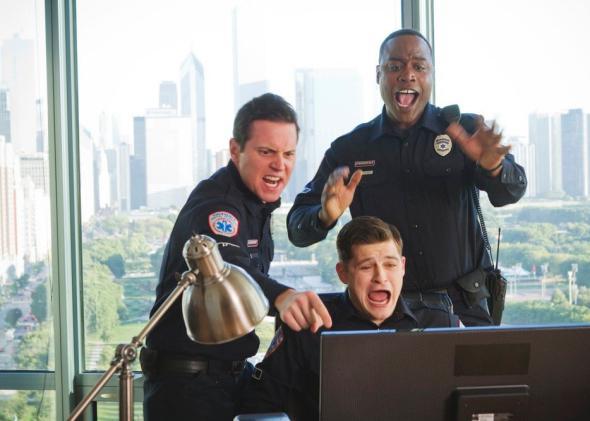Elisabeth Kübler-Ross identified the five stages of grief as denial, anger, bargaining, depression, and acceptance. In the second decade of the 21st century, we can now say that gay viewers have responded to television with those same emotions. We just experienced them in a different order.
First came bargaining, when we would look at an unmarried career woman—say, The Beverly Hillbillies’ Miss Hathaway—and talk ourselves into seeing her as a stealth lesbian. Then we moved on to denial, a painful stage in which we were so desperate for representation that we told ourselves that mediocre sitcoms like Ellen or Will & Grace were good, and that ground-breaking (which they were) was more important than funny (which they often weren’t). A few years later, we drifted into acceptance: The L Word was a nightmare, but at least its presence on the TV schedule proved that the straight world knew we existed. (Though judging from the show’s sex scenes, it didn’t have a clue what we do in bed.) When The L Word morphed into The Real L Word, we tasted anger. Like straight consumers of reality television before us, we looked at the tortured souls chosen to represent us to the world at large and cried out: I’m not like that! Now, we seem finally to have reached depression: There are quite a few homosexuals on television, but we find them boring.
But gay TV doesn’t have to be a downer. My personal anti-depressant strategy is to watch lots of it. If one small-screen version of gay life offends, seek out another.
That’s why I’m excited by Sirens, which premieres on USA at 10 p.m. tonight. Sirens isn’t exactly a gay show—it’s a comedy about three EMTs, one of whom is in love with a cop—but one of the EMTs, Hank (played by Kevin Daniels, Modern Family’s Longinus), is a frankly, proudly, openly gay man. He doesn’t elide pronouns when he talks about exes or hide the fact that he’s attracted to guys, but being gay isn’t really a big deal for him. It’s one—important—part of his character.
If you’re worried that there’s very little difference between “no big deal” and “boring,” have no fear. There’s nothing dull about Sirens. I know it’s reductive to compare Sirens with HBO’s Looking—to do so is to live in a world where gay material can only be considered in comparison with other gay fiction—but let’s do it anyway. Whereas Looking is an Andrew Haigh rumination on the private lives of a diverse bunch of young-ish gay men in San Francisco, Sirens is a rollicking Denis Leary comedy about the work lives of a group of mostly white, mostly straight guys in Chicago. (Gay Hank is also African-American.)
Whereas premium cable “comedies” are rarely funny and don’t even seem to be trying to make viewers laugh, Sirens goes for the guffaw. As you might expect from a Denis Leary project—he wrote the show with Bob Fisher, the man behind Wedding Crashers and We’re the Millers—Sirens combines an edgy premium-cable sensibility (on basic-cable USA, that means that while the pilot revolves around a guy with a soda bottle stuck in his butt, we don’t see the bottle while it’s in situ) with astute psychological observations. Hank is still holding a torch for his ex, Jeff the Chef, who is about to get married. His best friend and on-the-job partner Johnny (played charmingly by Michael Mosley) can’t commit to smart, sassy, down-to-earth Theresa, perhaps because his dad left his mom for a stripper named Coco.
Sirens is based—very loosely, according to Fisher—on a British show of the same name. (In the original, the gay character was played by Richard Madden, better known to Game of Thrones fans as Robb Stark.) Fisher says he never considered heterosexualizing the character in the American version: “Denis and I just really responded to the relationship between these two guys. It was just a part of their lives, it wasn’t a problem, it wasn’t a thing. I liked that—it felt cool and contemporary.” Fisher also told me, “I don’t think that Hank being gay led to any drama that was unique to being gay.” This is both a step forward—back in the days of denial and anger, all too many gay plots revolved around bashing, bullying, and blackmail—but also a bit of a bummer. In the four episodes that I’ve seen, there isn’t anything uniquely gay about Hank—other than his desire to make out with other men—and that’s too bad. Then again, there isn’t anything uniquely African-American about him, either.
When I asked Michael Mosley—I talked to Daniels, Fisher, and Mosley at the Television Critics Association gathering this January—if there were any particular challenges to playing a straight character whose best friend is gay, he laughed: “Not at all. Not even a little bit. This relationship has been attempted in the past, and it’s always been like, ‘He’s gay, and he’s straight. Wrap your brain around that!’ As if it’s a brain-bender. It’s such a side thing. I’ll bust his balls about who he’s dating like I would if he were talking about a girl.”
Perhaps the sixth stage of gay TV viewing will be ball-busting.
